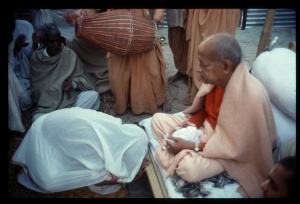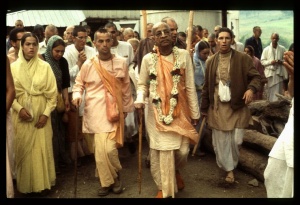SB 2.6.40-41

A.C. Bhaktivedanta Swami Prabhupada
TEXTS 40-41
viśuddhaṁ kevalaṁ jñānaṁ
pratyak samyag avasthitam
satyaṁ pūrṇam anādy-antaṁ
nirguṇaṁ nityam advayam
ṛṣe vidanti munayaḥ
praśāntātmendriyāśayāḥ
yadā tad evāsat-tarkais
tirodhīyeta viplutam
SYNONYMS
viśuddham—without any material tinge; kevalam—pure and perfect; jñānam—knowledge; pratyak—all-pervading; samyak—in fullness; avasthitam—situated; satyam—truth; pūrṇam—absolute; anādi—without any beginning; antam—and so also without any end; nirguṇam—devoid of material modes; nityam—eternal; advayam—without any rival; ṛṣe—O Nārada, O great sage; vidanti—they can only understand; munayaḥ—the great thinkers; praśānta—pacified; ātma—self; indriya—senses; āśayāḥ—sheltered; yadā—while; tat—that; eva—certainly; asat—untenable; tarkaiḥ—arguments; tiraḥ-dhīyeta—disappears; viplutam—distorted.
TRANSLATION
The Personality of Godhead is pure, being free from all contaminations of material tinges. He is the Absolute Truth and the embodiment of full and perfect knowledge. He is all-pervading, without beginning or end, and without rival. O Nārada, O great sage, the great thinkers can know Him when completely freed from all material hankerings and when sheltered under undisturbed conditions of the senses. Otherwise, by untenable arguments, all is distorted, and the Lord disappears from our sight.
PURPORT
Here is an estimation of the Lord apart from His transcendental activities in the temporary, material creations. Māyāvāda philosophy tries to designate the Lord as contaminated by a material body when He accepts forms of incarnation. This sort of interpolation is completely denied herein by the explanation that the Lord's position is pure and unalloyed in all circumstances. According to Māyāvāda philosophy, the spirit soul, when covered by nescience, is designated as jīva, but when freed from such ignorance or nescience he merges in the impersonal existence of the Absolute Truth. But here it is said that the Lord is eternally the symbol of full and perfect knowledge. This is His speciality: perpetual freedom from all material contaminations. This distinguishes the Lord from the individual, common living entities who have the aptitude for being subordinated by nescience and thus becoming materially designated. In the Vedas it is said that the Lord is vijñānam ānandam, full of bliss and knowledge. The conditioned souls are never to be compared to Him because such individual souls have the tendency to become contaminated. Although after liberation the living entity can become one with the same quality of existence as the Lord, his very tendency to become contaminated, which the Lord never has, makes the individual living entity different from the Lord. In the Vedas it is said, śuddham apāpa-viddham: the individual ātmā becomes polluted by sin, but the Lord is never contaminated by sins. The Lord is compared to the powerful sun. The sun is never contaminated by anything infectious because it is so powerful. On the contrary, infected things are sterilized by the rays of the sun. Similarly, the Lord is never contaminated by sins; on the contrary, the sinful living entities become sterilized by contact with the Lord. This means that the Lord is also all-pervading like the sun, and as such the word pratyak is used in this verse. Nothing is excluded from the existence of the Lord's potential expansions. The Lord is within everything, and He is all-covering also, without being disturbed by the activities of the individual souls. He is therefore infinite, and the living entities are infinitesimal. In the Vedas it is said that only the Lord alone exists, and all others' existences depend on Him. He is the generating reservoir for everyone's existential capacity; He is the Supreme Truth of all other categorical truths. He is the source of everyone's opulence, and therefore no one can equal Him in opulence. Being full of all opulences, namely wealth, fame, strength, beauty, knowledge and renunciation, certainly He is the Supreme Person. And because He is a person, He has many personal qualities, although He is transcendental to the material modes. We have already discussed the statement, itthaṁ-bhūta-guṇo hariḥ (SB 1.7.10). His transcendental qualities are so attractive that even the liberated souls (ātmārāmas) are also attracted by them. Although possessed of all personal qualities, He is nevertheless omnipotent. Therefore, personally He has nothing to do, for everything is being carried out by His omnipotent energies. This is confirmed by the Vedic mantras: parāsya śaktir vividhaiva śrūyate svābhāvikī jñāna-bala-kriyā ca [Cc. Madhya 13.65, purport]. This suggests His specific spiritual form, which can never be experienced by the material senses. He can be seen only when the senses are purified by devotional service (yam evaiṣa vṛṇute tena -labhyaḥ Kaṭha Upaniṣad 1.2.23). As such, there are basic differences between the Lord and the living entities, in so many respects. No one can be compared to the Lord, as the Vedas declare (ekam evādvitīyaṁ brahma, dvaitād vai bhayaṁ bhavati). The Lord has no competitor, and He has nothing to fear from any other being, nor can anyone be equal to Him. Although He is the root of all other beings, there are basic differences between Him and other beings. Otherwise there would have been no necessity for the statement in the previous verse that no one can know Him one hundred percent as He is (na yaṁ vidanti tattvena). That no one can fully understand Him is explained also in this verse, but the qualification for understanding to some degree is mentioned here. Only the praśāntas, or the unalloyed devotees of the Lord, can know Him to a greater extent. The reason is that the devotees have no demands in their lives but to be obedient servants of the Lord, while all others, namely the empiric philosophers, the mystics and the fruitive workers, all basically have some demand, and as such they cannot be pacified. The fruitive worker wants reward for his work, the mystic wants some perfection of life, and the empiric philosopher wants to merge in the existence of the Lord. Somehow or other, as long as there is a demand for sense satisfaction, there is no chance for pacification; on the contrary, by unnecessary dry speculative arguments, the whole matter becomes distorted, and thus the Lord moves still further away from our understanding. The dry speculators, however, because of their following the principles of austerity and penance, can have knowledge of the impersonal features of the Lord to some extent, but there is no chance of their understanding His ultimate form as Govinda because only the amalātmanas, or the completely sinless persons, can accept pure devotional service to the Lord, as confirmed in the Bhagavad-gītā (BG 7.28):
- yeṣāṁ tv anta-gataṁ pāpaṁ
- janānāṁ puṇya-karmaṇām
- te dvandva-moha-nirmuktā
- bhajante māṁ dṛḍha-vratāḥ
SB 2.6.42
2008-03-16T18:10:01Z
Acyuta
2

A.C. Bhaktivedanta Swami Prabhupada
TEXT 42
ādyo 'vatāraḥ puruṣaḥ parasya
kālaḥ svabhāvaḥ sad-asan-manaś ca
dravyaṁ vikāro guṇa indriyāṇi
virāṭ svarāṭ sthāsnu cariṣṇu bhūmnaḥ
SYNONYMS
ādyaḥ—first; avatāraḥ—incarnation; puruṣaḥ—Kāraṇārṇavaśāyī Viṣṇu; parasya—of the Lord; kālaḥ—time; svabhāvaḥ—space; sat—result; asat—cause; manaḥ—mind; ca—also; dravyam—elements; vikāraḥ—material ego; guṇaḥ—modes of nature; indriyāṇi—senses; virāṭ—the complete whole body; svarāṭ—Garbhodakaśāyī Viṣṇu; sthāsnu—immovable; cariṣṇu—movable; bhūmnaḥ—of the Supreme Lord.
TRANSLATION
Kāraṇārṇavaśāyī Viṣṇu is the first incarnation of the Supreme Lord, and He is the master of eternal time, space, cause and effects, mind, the elements, the material ego, the modes of nature, the senses, the universal form of the Lord, Garbhodakaśāyī Viṣṇu, and the sum total of all living beings, both moving and nonmoving.
PURPORT
That the material creation is not permanent has been discussed many times hereinbefore. The material creation is but a temporary exhibition of the material energy of the Almighty God. This material manifestation is necessary to give a chance to the conditioned souls who are unwilling to associate with the Lord in the relationship of loving transcendental service. Such unwilling conditioned souls are not allowed to enter into the liberated life of spiritual existence because at heart they are not willing to serve. Instead, they want to enjoy themselves as imitation Gods. The living entities are constitutionally eternal servitors of the Lord, but some of them, because of misusing their independence, do not wish to serve; therefore they are allowed to enjoy the material nature, which is called māyā, or illusion. It is called illusion because the living beings under the clutches of māyā are not factually enjoyers, although they think that they are, being illusioned by māyā. Such illusioned living entities are given a chance at intervals to rectify their perverted mentality of becoming false masters of the material nature, and they are imparted lessons from the Vedas about their eternal relationship with the Supreme Lord Kṛṣṇa (vedaiś ca sarvair aham eva vedyaḥ (BG 15.15)). So the temporary creation of the material manifestation is an exhibition of the material energy of the Lord, and to manage the whole show the Supreme Lord incarnates Himself as the Kāraṇārṇavaśāyī Viṣṇu just as a magistrate is deputed by the government to manage affairs temporarily. This Kāraṇodakaśāyī Viṣṇu causes the manifestation of material creation by looking over His material energy (sa aikṣata). In the first volume of this book we have already discussed to some extent the explanation of the verse jagṛhe pauruṣaṁ rūpam. The duration of the illusory play of material creation is called a kalpa, and we have already discussed the creation's taking place in kalpa after kalpa. By His incarnation and potential activities, the complete ingredients of creation, namely time, space, cause, result, mind, the gross and subtle elements and their interactional modes of nature—goodness, passion and ignorance—and then the senses and their reservoir source, the gigantic universal form as the second incarnation Garbhodakaśāyī Viṣṇu, and all living beings, both moving and standing, which come out of the second incarnation, all became manifested. Ultimately, all these creative elements and the creation itself are but potential manifestations of the Supreme Lord; nothing is independent of the control of the Supreme Being. This first incarnation in the material creation, namely Kāraṇārṇavaśāyī Viṣṇu, is the plenary part of the original Personality of Godhead, Śrī Kṛṣṇa, described in the Brahma-saṁhitā (BS 5.38) as follows:
- yasyaika-niśvasita-kālam athāvalambya
- jīvanti loma-vilajā jagad-aṇḍa-nāthāḥ
- viṣṇur mahān sa iha yasya kalā-viśeṣo
- govindam ādi-puruṣaṁ tam ahaṁ bhajāmi
All the innumerable universes are maintained only during the breathing period of Mahā-Viṣṇu, or Kāraṇārṇavaśāyī Viṣṇu, who is only a plenary part of Govinda, the original Personality of Godhead Lord Kṛṣṇa.